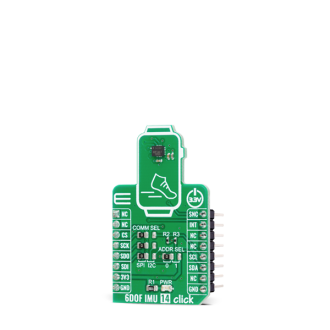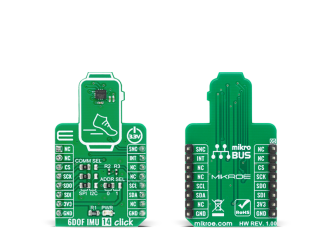
We strongly encourage users to use Package manager for sharing their code on Libstock website, because it boosts your efficiency and leaves the end user with no room for error. [more info]

Rating:
Author: MIKROE
Last Updated: 2020-08-19
Package Version: 1.0.0.0
mikroSDK Library: 1.0.0.0
Category: Motion
Downloaded: 4203 times
Not followed.
License: MIT license
6DOF IMU 14 Click is a compact add-on board that contains a 6-axis MEMS motion tracking device combining a 3-axis gyroscope and a 3-axis accelerometer. This board features the ICM-42688-P, high precision 6-axis MEMS motion tracking device, from TDK InvenSense.
Do you want to subscribe in order to receive notifications regarding "6DOF IMU 14 click" changes.
Do you want to unsubscribe in order to stop receiving notifications regarding "6DOF IMU 14 click" changes.
Do you want to report abuse regarding "6DOF IMU 14 click".


Library Description
The library contains a basic functions for using 6DOF IMU 14 click.
Key functions:
void c6dofimu14_get_gyro_axis ( c6dofimu14_axis_t *axis ) - Gets GYRO XYZ axis valuevoid c6dofimu14_get_accel_axis ( c6dofimu14_axis_t *axis ) - Gets ACCEL XYZ axis valuefloat c6dofimu14_get_temperature ( void ) - Gets Temperature valueExamples description
The application is composed of three sections :
void application_task ( )
{
float temperature;
c6dofimu14_axis_t accel;
c6dofimu14_axis_t gyro;
mikrobus_logWrite( " ", _LOG_LINE );
// ACCEL DATA
c6dofimu14_get_accel_axis( &accel );
FloatToStr( accel.x, demo_text );
mikrobus_logWrite( " >> Accel: X: ", _LOG_TEXT );
mikrobus_logWrite( demo_text, _LOG_TEXT );
FloatToStr( accel.y, demo_text );
mikrobus_logWrite( " Y: ", _LOG_TEXT );
mikrobus_logWrite( demo_text, _LOG_TEXT );
FloatToStr( accel.z, demo_text );
mikrobus_logWrite( " Z: ", _LOG_TEXT );
mikrobus_logWrite( demo_text, _LOG_LINE );
// GYRO DATA
c6dofimu14_get_gyro_axis( &gyro );
FloatToStr( gyro.x, demo_text );
mikrobus_logWrite( " >> Gyro: X: ", _LOG_TEXT );
mikrobus_logWrite( demo_text, _LOG_TEXT );
FloatToStr( gyro.y, demo_text );
mikrobus_logWrite( " Y: ", _LOG_TEXT );
mikrobus_logWrite( demo_text, _LOG_TEXT );
FloatToStr( gyro.z, demo_text );
mikrobus_logWrite( " Z: ", _LOG_TEXT );
mikrobus_logWrite( demo_text, _LOG_LINE );
// TEMPERATURE
temperature = c6dofimu14_get_temperature( );
FloatToStr( temperature, demo_text );
mikrobus_logWrite( " >> Temperature: ", _LOG_TEXT );
mikrobus_logWrite( demo_text, _LOG_LINE );
mikrobus_logWrite( "--------------------------", _LOG_LINE );
Delay_ms( 1500 );
}
Other mikroE Libraries used in the example:
Additional notes and informations
Depending on the development board you are using, you may need USB UART click, USB UART 2 click or RS232 click to connect to your PC, for development systems with no UART to USB interface available on the board. The terminal available in all MikroElektronika compilers, or any other terminal application of your choice, can be used to read the message.